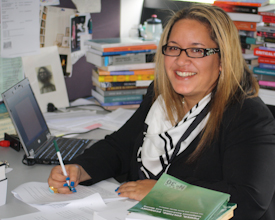UNPFII Member Megan Davis
 |
Ms. Megan Davis
Occupation: Associate Professor of Law and Director of the Indigenous Law Centre, Faculty of Law, University of New South Wales
|
Megan Davis (Cobble Cobble – South East Queensland) is currently Associate Professor and Director of the Indigenous Law Centre, Faculty of Law at the University of New South Wales and is a Commissioner of the New South Wales Land and Environment Court, and an Australian member of the International Law Association’s Indigenous Rights Committee. Megan has previously held the position of Director, Bill of Rights project, Gilbert + Tobin Centre of Public Law, Faculty of Law, UNSW. Megan Davis is from Queensland and has Aboriginal and South Sea Islander background.
Megan was a UN Indigenous Fellow of the Office of the High Commissioner for Human Rights, Geneva in 1999 (with Kristina Nordling, Ferry Marisan and Konstantin Roebeck).
Megan is an international human rights lawyer and has participated for over a decade in UN expert seminars and working groups including UN Working Group on Indigenous Populations, UN Permanent Forum on Indigenous Issues and the Commission on Human Rights working group elaborating a Declaration on the rights of Indigenous peoples from 1998-2004.
Megan has a BA (Australian History), LLB (UQ); Grad. Dip. Leg. Pract., LLM (International Law) ANU and recently completed a PhD in Law (ANU) on the limitations of the right to self-determination for Aboriginal women. Megan is also an admitted solicitor of the Supreme Court of the Australian Capital Territory.
Currently Megan teaches, researches and writes in the area of Indigenous peoples in Public Law, particularly Australian constitutional law, democratic theory and governance – and – and international law, especially that concerning the United Nations Declaration on the Rights of Indigenous Peoples. She currently lectures in the Faculty of Law, UNSW in Public Law, International Human Rights Law, Indigenous Peoples in International Law and Indigenous Peoples and the Law.
Megan’s main area of research focus is Aboriginal women’s rights including Aboriginal women’s political participation and violence against Aboriginal women. Megan is currently leading a national research project at the Indigenous Law Centre on the experiences of Aboriginal women and children before the courts in sexual assault cases. Megan’s doctoral thesis, to be published in a book, argues that the right to self-determination as it is recognised in international law does not pay adequate attention to the situation of Indigenous women and explores in particular one aspect of Martha Nussbaum’s theory of capabilities, a constitutional guarantee to equality.
The author of numerous journal articles and book chapters, Megan is also co-author of Indigenous Legal Issues: Commentary and Materials (Lawbook, 4th ed, 2009) and a co-authored text with Dr Sarah Pritchard (forthcoming 2011) The United Nations Declaration on the Rights of Indigenous Peoples (Federation Press) and more recently ‘Indigenous Australians and the Preamble: Towards a More Inclusive Constitution or Entrenching Marginalisation’ (2010) 33 (2) University of New South Wales Law Journal 239 and `United Nations Declaration on the Rights of Indigenous Peoples` 9 (2) Melbourne Journal of International Law 439-471 and ‘International Human Rights Law, Women’s Rights and the Intervention’ (2009) 7 (10) Indigenous Law Bulletin 11-14.
Megan is currently the female co-Chair of the Ethics Committee, Congress of Australia’s First Peoples. Megan is a board member of the Diplomacy Training Program (DTP), a member of Ngara Yura Judicial Commission of NSW, the NSW Sentencing Council and has been an expert trainer with UNITAR. Megan is an Editor of the Australian Indigenous Law Review and on the Editorial Panel of the Indigenous Law Bulletin. Megan is the 2010 NAIDOC Scholar of the Year. In 2010 Megan was appointed by the Federal government as an expert to the Expert Panel on the Recognition of Indigenous Australians in the Constitution.
 Welcome to the United Nations
Welcome to the United Nations